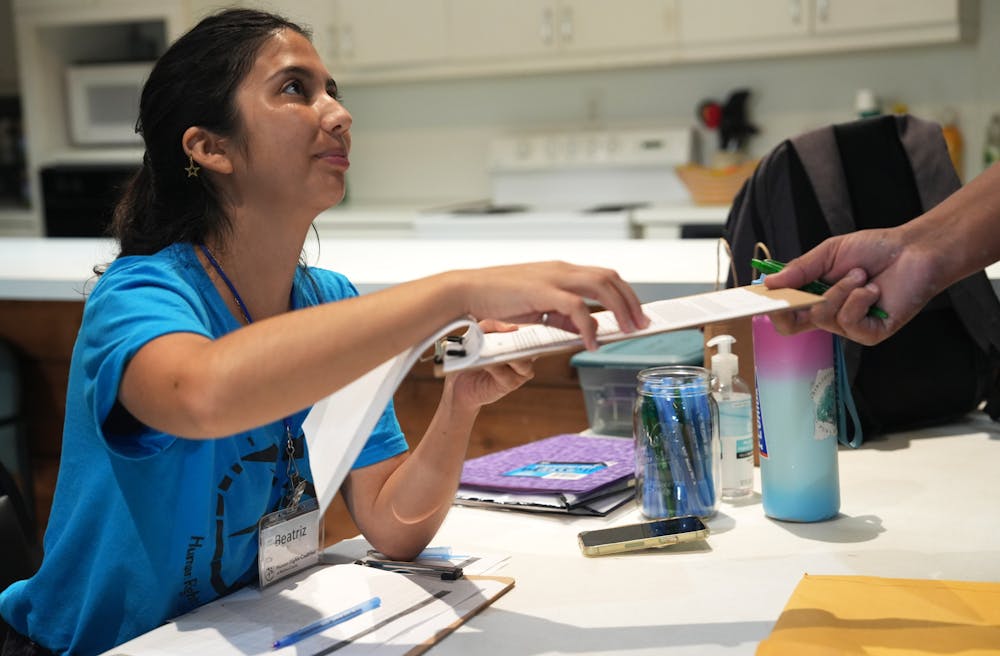A congregation filed into the Westminster Presbyterian Church not to pray, but to receive valuable identification cards.
The local non-profit Human Rights Coalition of Alachua County hosts short, appointment-driven events at least once a month since it established the Community ID Program. They continue to hold these drive-bys twice a month.
While initially accepted by few organizations, the utility of this community ID has grown significantly. After being approved for use with city, county and law enforcement officials, other institutions such as Grace Marketplace, UF Health Shands, mobile outreach clinics and food banks have accepted the community ID as valid identification.
Veronica Robleto, a 43-year-old Alachua County resident, has been the program’s director since 2022.
“It's to help individuals that have barriers to accessing state-issued ID to be able to identify themselves as who they say they are,” Robleto said. “But also as members of the community because many immigrants in our community might have a passport from their country. It kind of bothers you and shows that you're not from here.”
While the program aims to provide identification cards to migrants in Alachua County, it also finds value with other marginalized groups in Gainesville like the recently incarcerated and homeless.
“There's a lot of other people who also experienced barriers to accessing state ID, such as individuals reentering from incarceration, individuals experiencing housing insecurity or homelessness,” Robleto said. “Because even if you are a US citizen, if you don't have a permanent address, you can't get a state ID.”
The process to receive an ID entails scheduling an appointment with Human Rights Coalition on its website and watching a short orientation video with more information about the ID.
Participants need to bring documents to their appointment that demonstrate their identity, age and address. Pictures are taken, and the IDs are printed on-site, so everyone leaves the appointment with their new community ID in hand.
After appointments, the Human Rights Coalition also connects residents to similar initiatives in Alachua County, such as the Rural Women’s Health Project, a non-profit based on community support through education with an emphasis on health care.
“We bring them information on health, COVID vaccines, where they can go if they are in need and how to call our organization for any of the programs that we have about health,” said Magglorys Zelaya, a 53-year-old representative for the project.
Aside from health-related projects, the Rural Women’s Health Project also informs Spanish-speakers on how to interact with state officials.
“We have had events where we tell the community how to prepare themselves if the police stops them; what they should do, how not to be nervous, so that they are prepared for any situation that occurs,” Zelaya said.
Senate Bill 1718, a law which tightens enforcement of immigrant worker identification and restricts funding for community identification was signed into law by Gov. Ron DeSantis in July. In light of this legislation, these interactions may become more frequent than ever, reinvigorating the purpose of the community ID.
Lexi Crespin, 20-year-old UF psychology sophomore and HRC volunteer noticed a new anxiety in the community as they receive their identification.
“You could definitely tell some people have been scared throughout the summer about it, which has been really sad to see,” she said. “Having this resource for them makes them feel more secure.”
This same legislation, however, has also put this program and the security that comes with it into jeopardy. One of the parameters of this legislation prevents city and county governments from funding community ID programs.
“Now we have to start helping the fundraising,” Crespin said. “We already rely on volunteer labor pretty much, so we have to additionally find more funds on top of that.”
Another HRC volunteer, 77-year-old David Reed, feels much the same frustration.
“They don't think that what we're doing is good for the community, which I don't understand. Why would you want to have less documentation? I don’t understand that,” he said.
Amy Schirmer, 59-year-old Howard Bishop Middle School teacher and HRC volunteer, confirms the program strengthens the sense of a community bond, especially for immigrants.
“There's something about having something with your name and address saying ‘you belong here, you exist here’,” she said. “When you don't have that you feel like you're not really part of the community at all. We want people to feel welcome, as well as safe.”
Beneficiaries of the program likewise agree that the program has a generally positive effect. Felipe Velasquez, an ID recipient and Alachua city resident, shared his experience with the community ID program.
“I think it’s a good opportunity they're making. I hope they keep supporting the Hispanic community,” he said.
Contact Eluney at eluney13@gmail.com. Follow him on Twitter @Eluney_G






